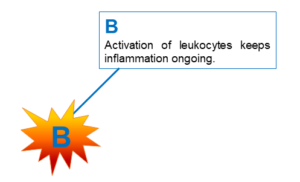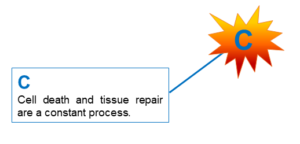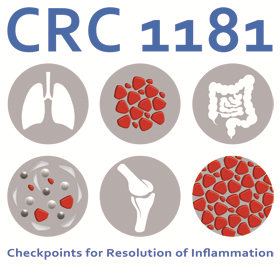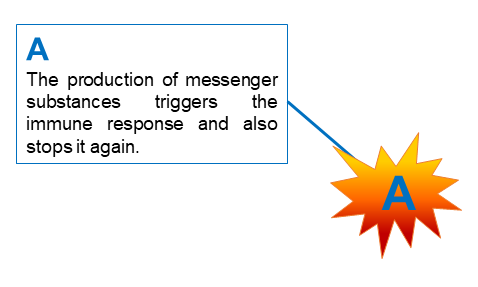Projects 2019 – 2023
Checkpoint A: Switch from pro- to anti-inflammatory cytokine response
Within the first funding period, a groundbreaking discovery could be made within the project block of the checkpoint A, which deals with the control of messenger substances (cytkoins). The messenger IL-9 has been identified as a major control cytokine in the resolution of arthritis in model and clinical studies. (Rauber S et al. 2017.). In particular, these results foster the concept of situation-dependent resolution mechanisms, since IL-9 is more pro-inflammatory than pro-reolving in inflammatory bowel diseases (Gerlach K et al. 2014.). Further, pro-resolving functions of the TH2 cytokines IL-4/IL-13 and IL-5, which are otherwise involved in the development of asthma, were discovered within the CRC1181 in arthritis. Our observations clearly indicate that the TH2-eosinophilic axis exerts immunoregulatory effects in arthritis and thus provides molecular evidence for the concept of the “eosinophil-driven dawn of recovery” first described by Paul Ehrlich in 1879 (Chen Z et al. 2016.). In accordance with this concept, helminth infection has been shown to inhibit autoimmunity (Sarter K et al. 2017.) and type 2 congenital lymphocytic cells have been identified as proliferant and disease controlling properties in murine and human arthritis (Rauber S et al. 2017.; Soare A et al. 2018.; Omata Y et al. 2018.). Pro-resolving effector functions were attributed to macrophage polarization towards an anti-inflammatory STAT6 expressing phenotype orchestrated by the AP-1 transcription factor c-Jun (Hannemann N et al. 2017.). In this context, the most important preliminary data for the next funding period suggest that the polarization of macrophages by IL-4 and IL-33 differs fundamentally in the resolution of inflammation: The IL-33-induced expression of the transcription factor GATA-3 in macrophages serves as a central control switch for the resolution of inflammation after tissue damage by controlling the metabolic function of macrophages (Faas et al., Project A03; unpublished observations). In contrast, GATA3, a master control transcription factor for type 2 immune reactions, makes colitis chronic rather than soluble (Popp V et al. 2017.), which suggests organ-specific molecular control of the resolution and chronicity of inflammation in the intestine. This result has also enabled the initiation of a Phase 2a clinical trial with DNAzyme targeting GATA3 to resolve inflammation in colitis. In a model of allergic lung disease, IL-27 was identified as an important cytokine that orchestrates the resolution of inflammation.
A01: The importance of ILC2 dependent resident versus induced eosinophils in the resolution of inflammatory arthritis
Principle Investigators
Aline Bozec Georg Schett
Team
Darja Andreev
A02: STAT6-regulated resolution of inflammation in mucosal tissues
Principle Investigator
David Vöhringer
A03: Alarmin-induced immunometabolic reprogramming during the resolution of inflammation
Project A03 will closely look at the mechanisms of IL-33-induced mitochondrial reprogramming of macrophages that directly controls alternatively activated macrophage differentiation during tissue injury and involves the uncoupling of the respiratory chain and production of the Krebs cycle-derived metabolite itaconate. In the project, the relevance of mitochondrial reprogramming in macrophages for the resolution of inflammation and human inflammatory diseases such as rheumatoid arthritis will be determined.
Principle Investigator
Gerhard Krönke
Team
Brenda Krishnacoumar Maria Faas Monica Pascual Mate
A05: Modification of cytokines by myeloperoxidase activity and (un)known mediators in resolution of psoriatic disease
This team investigates a novel immune regulatory role of myeloperoxidase (MPO) in neutrophils and monocytes/ macrophages. Preliminary data suggest that in the absence of MPO, the activity of proteases released from granulocytes and monocytes/macrophages is increased and activates the pro-inflammatory cytokine IL-36. Project A05 therefore addresses the functional role of MPO in resolution of inflammation, i.e. by modifying IL-36 cytokine activity.
Principal Investigators
Ulrike Hüffmeier Silke Frey
A06: Host and pathogen determinants of resolution or chronic inflammation in coxiella burnetii infection
The project focuses on the resolution of inflammation in Q fever. Specifically, it aims to identify pathways that prevent resolution of inflammation and therefore allow for survival and persistence of C. burnetii in macrophages. Data from the first funding period show that hypoxia, HIF1a and STAT3 are key regulators of this process and that the macrophage metabolite citrate is critical for intracellular bacterial replication. The goal of the project is to elucidate the molecular mechanisms of the HIF1a-STAT3-citrate axis in vitro and in vivo.
Principal Investigators
Roland Lang Anja Lührmann
Team
Lisa Kohl Inaya Hayek
A07: Deciphering the dectin-1, FcγRIIb and dendritic cell subset dependent pathways of IVIg mediated resolution of autoimmune inflammation
Project A07 searches for the molecular mechanism by which immunoglobulin G molecules exert their regulatory function on innate immune effector cells and dendritic cells, thereby provoking resolution of inflammation. The experiments proposed for the second funding period build on the observation of the first funding period, revealing that the neonatal FcRn, the Dectin-1/FcgRIIb axis and select dendritic cell subpopulations are involved in triggering resolution of inflammation. The project links adaptive and innate immunity in resolution of inflammation.
Principle Investigators
Falk Nimmerjahn Diana Dudziak
Checkpoint B: Blockade of pro-inflammatory lymphocyte activation
 The projects in this block B focus on molecular mechanisms of adaptive immune responses that determine the resolution and chronicity of inflammation. In the first funding period, two T-cell-related factors were identified that control resistance to the resolution of inflammation in colitis: IL-23 receptor secretion on intestinal T cells allowed to avoid the resolution of inflammation caused by tumor necrosis (TNF) antagonists (Schmitt H, et al. 2018.), while IL-7 receptor secretion on intestinal T cells prevented the resolution of colitis during graft-to-host disease by activating the transcription factor BATF (Ullrich E, et al. 2018.). In addition to the T cell mechanisms, several humoral mechanisms were deciphered that prevent the resolution of the autoimmune disease. In particular, in a clinical study with patients with rheumatoid arthritis, autoantibodies were identified as major factors for the failure of effective resolution (Figueiredo CP, et al. 2017.). Furthermore, it was recognized that cytokine-mediated regulation of antibody glycosylation and selective binding of Fc receptors are mechanisms that allow chronic inflammation rather than resolution (Lehmann CHK, et al. 2017.). Finally, the cytokine-based mechanisms regulating the inflammatory or pro-resolving properties of antibodies were carefully analyzed in the first funding period, which led to the discovery that IL-23 is a key signal promoting the pathogenicity and chronicity of antibody inflammation (Pfeiffle R, et al. 2017.).
The projects in this block B focus on molecular mechanisms of adaptive immune responses that determine the resolution and chronicity of inflammation. In the first funding period, two T-cell-related factors were identified that control resistance to the resolution of inflammation in colitis: IL-23 receptor secretion on intestinal T cells allowed to avoid the resolution of inflammation caused by tumor necrosis (TNF) antagonists (Schmitt H, et al. 2018.), while IL-7 receptor secretion on intestinal T cells prevented the resolution of colitis during graft-to-host disease by activating the transcription factor BATF (Ullrich E, et al. 2018.). In addition to the T cell mechanisms, several humoral mechanisms were deciphered that prevent the resolution of the autoimmune disease. In particular, in a clinical study with patients with rheumatoid arthritis, autoantibodies were identified as major factors for the failure of effective resolution (Figueiredo CP, et al. 2017.). Furthermore, it was recognized that cytokine-mediated regulation of antibody glycosylation and selective binding of Fc receptors are mechanisms that allow chronic inflammation rather than resolution (Lehmann CHK, et al. 2017.). Finally, the cytokine-based mechanisms regulating the inflammatory or pro-resolving properties of antibodies were carefully analyzed in the first funding period, which led to the discovery that IL-23 is a key signal promoting the pathogenicity and chronicity of antibody inflammation (Pfeiffle R, et al. 2017.).
B02: The Tec kinase ltk as regulator of Th2/Th9 cytokine production and resolution of inflammation in ulcerative colitis
Principles Investigators
Markus F. Neurath Benno Weigmann
Team
Kristina Lechner
B03: Role of IDO in resolution of inflammatory autoimmune responses by CD83-induced regulatory mechanisms in arthritis
The project will extend its work regarding the role of CD83-induced indoleamine-2,3-dioxygenase- (IDO) metabolism in resolution of inflammation. In the first funding period CD83 was identified as a key factor that not only stimulates the biosynthesis of IDO but also triggers resolution of inflammation. In the second phase of CRC1181, project B03 will follow the concept that CD83 activation modulates amino acid and short chain fatty acid metabolism and thereby facilitates resolution of inflammation.
Principles Investigator
Alexander Steinkasserer
Team
Dmytro Royzman Lena Stich
B05: Deciphering Batf-dependent and independent inflammatory and regulatory T cell programs at mucosal surfaces
The team is dedicated to study the role of the transcription factor Batf in T cells during resolution of inflammation. Based on the preliminary data obtained in the first funding period, Batf appears to influence the colonic pool of lamina propria (LP)-residing regulatory T cells (Tregs) as well as intra-epithelially located non-Treg CD4+ T cells. The project will now characterize the Batf-dependent regulation of LP and intra-epithelially resp. located CD4+ T lymphocyte subpopulations and how these subsets differentially impact the resolution of colitis in mice and men.
Principle Investigator
Kai Hildner
Team
Hanif Ullah Khan
B06: The role of Siglec-H and Siglec-15 in induction and resolution of inflammation
Siglecs (Sialic-acid-binding immunoglobulin-like lectins) are a family of receptors on immune cells, which bind to their ligands sialic acids and have mainly inhibitory functions. We could previously show that CD22 is a functional inhibitory receptor on B cells, while Siglec-G is an inhibitory receptor particularly for the subpopulation of B-1 cells. The deficiency of both Siglecs together leads to autoimmunity in mice. Based on their functional role in inhibiting immune cells of the innate and adaptive immune system, Siglec proteins may play an important role in the resolution process during inflammation. Siglec-H and Siglec-15 are recently characterized members of this family. Siglec-H is expressed in a restricted fashion on plasmacytoid DCs (pDCs), while Siglec-15 is found on macrophages, conventional DCs and osteoclasts. Initial studies show that Siglec-15 seems to be functionally important for osteoclast differentiation, while Siglec-H inhibits IFNα production in pDCs. This suggests that Siglec-H normally leads to a resolution of inflammation triggered by virus infection, but without this Siglec chronicity may result.
In this project we want to further examine the role of Siglec-H in autoimmune disease as Systemic Lupus Erythematosis (SLE) and rheumatoid Arthritis (RA). Further we will be determined how loss of Siglec-15 affects osteoclast functions. Furthermore, we aim to develop Siglec-H- and Siglec-15-specific high affinity synthetic sialic acid ligands to target these Siglecs in autoimmune diseases. Such a strategy has already been used for other Siglecs expressed on other immune cells.
Principle Investigator
Lars Nitschke
Team
Lamina Özgör
B07: Microbiota-derived metabolite induced mechanisms during resolution of inflammation
Project B07N is a new project, which will be dedicated to the immune metabolic control of resolution of inflammation. Based on previous and preliminary data, short chain fatty acids, such as propionate and butyrate, which are derived from the gut microbiota, have immunoregulatory properties and may therefore support resolution of inflammation. In the project, the effect of propionate on myeloid progenitor cells will be studied following the hypothesis that it skews the lineage cells into a pro-resolving phenotype in a receptor-dependent manner. B07N links immune metabolism with resolution of inflammation.
Principle Investigator
Mario Zaiss
Team
Kerstin Dürholz
B08: Molecular mechanisms controlling regulatory T cell activation in the resolution of asthma
This is a new project aiming to uncover molecular pathways in the resolution of asthma. It focuses on the regulatory function of IL-3, which is required for the resolution of asthma and pursues the concept that regulatory cytokines exist that control immunoregulation during resolution. Based on preliminary data the project aims to investigate the inhibitory role of IL-3/IL-3R signalling on ILC2 and Th2 cells in asthma in mice and men. B08N is a central project for asthma modelling.
Principle Investigator
Susetta Finotto
Team
Cindy Eva Ament
Checkpoint C: Fostering of tissue remodeling by cell death and tissue repair mechanisms

In the first funding period of the CRC1181, new insights were gained into neutrophil death and the formation of DNA networks by neutrophil granulocytes (NET) in degradable cytokines and thus mitigating inflammatory reactions (Hahn J, et a. 2019.). While NETs are effective in limiting inflammatory reactions, aggregated NET formation can also lead to harmful blockage of blood vessels (Lepples M, et al. 2016; Jiménez-Alcázar M, et al. 2017.). Several new findings from this CRC relate to factors of intestinal epithelial homeostasis that control the resolution of inflammation. The cytokines IL-28 (Chiriac MT, et al. 2017.), IL-33(Mahapatro M, et al. 2016.) and IL-36 (Scheibe K, et al. 2017.) as well as the intracellular enzyme caspase-8 (Ruder B, et al. 2018.) are decisive factors for the maintenance vs. resolution of inflammation and a strong influence on epithelial homeostasis. Furthermore, within the CRC1181 consortium, a homeostatic macrophage-membrane-like surface structure could be defined in the joints, which share some of the molecular properties of epithelial cells (Culemann S, Grueneboom A, in Press.). Such structures control inflammatory processes in the joints by providing an immune barrier function. With respect to resident tissue responses associated with inflammation, it was found that transcription factor PU.1 serves as the main control switch for resident tissue activation (Wohlfahrt T, et al. 2019.). Furthermore, upstream of PU.1, SHP2 (Zehender A, et al. 2018.) and STAT3 (Chakraborty D, et al. 2017.) act as important control points for tissue fibrosis. Data from the CRC1881 consortium also showed that both in the model and in humans IL-36 signalling is associated with intestinal tissue fibrogenesis (Paduch K, et al. 2019.). Finally, arginase 1 (which is regarded as a marker for dissolution-promoting M2 macrophages) proved to be dispensable or even harmful for tissue repair in colitis (Scheibe K, et al. 2018.).
C01: Liver receptor homolog-1 (LHR-1) regulates inflammation-induced fibrotic tissue remodeling
The project focuses on the role of mesenchymal tissue responses and has established in vitro and in vivo techniques to characterize fibroblast activation, matrix deposition and repair. Based on preliminary data the project will define the role of liver receptor homolog-1 (LRH-1) in inflammation-induced tissue repair and fibrosis. LRH-1 is induced by TGFβ and controlled by epigenetic mechanisms that allow its persistent overexpression. The overexpression of LRH-1 promotes fibroblast activation and tissue fibrosis. C01 is a key project for analyzing mesenchymal tissue responses.
Principla Investigator
Jörg Distler
Team
Ariella Zehender (prev. Philippi-Schöninger) Markus Luber
C02: IL-23R dependent mechanisms mediating immunoresistance to biological therapy in chronic intestinal inflammation
The project addresses the role of T cells expressing the IL-23 receptor, which are resistant to cell death and promote the chronicity of intestinal inflammation. Induction of T cell apoptosis resolved colitis suggesting that adjacent cells provide essential survival signals to IL-23R+ T cells, such as IL-23 and other cytokines. In the second period, the project will analyse the molecular regulation of T cell survival signals expressed by monocytes/macrophages.
Principla Investigators
Clemens Neufert Raja Atreya
C03: Amplification of NET formation and neutrophil aggregation for the resolution of inflammation
The project leverages on the finding that aggregated neutrophil extracellular traps (NETs) contribute to resolution of inflammation by their capacity to degrade cytokines and chemokines. Based on the preliminary data obtained during the first funding period C03 will characterize the glycosidase activity in NETs, which modulates immunoglobulin-function and, apart from cytokine/chemokine cleavage, is presumably responsible for the resolution of inflammation by NETs. Furthermore, a pharmacological approach will be developed that allows amplification of reactive oxygen species (ROS) production by neutrophils and, in consequence, the formation of aggregated NET that induce resolution of inflammation.
Principles Investigators
Markus Hoffmann Martin Herrmann
Team
Yan-li TongYan-li Tong Maximilian Euler
C04: Arginase 1 and 2 in the induction, maintenance and resolution of chronic epithelial inflammation
The objectives of the project are to unravel the mechanisms underlying the unexpected finding that arginase (Arg) 1 is inhibiting rather than promoting resolution of chronic colitis and cutaneous leishmaniasis. It builds on preliminary data from the first funding period showing that Arg1 affects the composition of the intestinal microbiome, the expression of proinflammatory cytokines and the metabolism of macrophages and intestinal tissue. The potential pro-resolving role of arginine and of microbiota derived from Tie2Cre+/-Arg1fl/fl mice will be studied.
Principle Investigator
Ulrike Schleicher Christian Bogdan Jochen Mattner
Team
C05: Role of epithelial cell death for re-establishment of the gut barrier during resolution of intestinal inflammation
The team demonstrated that resolution of intestinal inflammation requires stringent control of epithelial cell death to allow re-establishment of efficient gut barrier function. In preliminary studies, PGE2 was identified as a novel and potent regulator of epithelial necroptosis, thereby promoting resolution of colitis. Further data indicate that this protective pathway might involve the EP4 receptor and the necroptosis molecule MLKL. However, how PGE2 signalling interferes with necroptosis on a molecular level and how this impacts epithelial survival in an inflammatory environment, the gut barrier function and the course of intestinal inflammation is currently unknown and the aim of this project.
Principal Investigator
Christoph Becker
Team
Jay Patankar Lena Schödel
C06: Interplay between immune and stromal cells orchestrating resolution of inflammation
This is a new project, which leverages on key novel insights in ILC2 orchestrating resolution of inflammation. Based on additional preliminary data, the new project hypothesizes that ILC2 can context-dependently shape the resident mesenchymal tissue environment into a pro-resolving and matrix producing phenotype. Mediators that control the communication between ILC2s and fibroblasts will be characterized and validated as potential therapeutic targets to induce resolution of inflammation. C06N brings strong expertise in ILCs into the CRC1181.
Principal Investigator
Andreas Ramming
Team
C07: The immune-metabolic basis of the DEL-1/αvβ3 integrin-dependent induction of resolving macrophages in the resolution of inflammatory arthritis
This project is a new project, which builds on very recent findings on the molecular nature of the pro-resolving effect of efferocytosis- the uptake of apoptotic neutrophils by macrophages. It is based on a new pathway in resolution of inflammation: The DEL-1/avb3 integrin-dependent efferocytosis of apoptotic neutrophils by macrophages promotes the emergence of a pro-resolving macrophage phenotype. The project aims at understanding the cellular metabolic basis of the DEL-1/avb3 integrin-dependent induction of pro-resolving macrophages in the context of resolution of inflammatory arthritis. C07N additionally brings cell metabolism expertise into the CRC1181.
Principal Investigator
Triantafyllos Chavakis
Team

